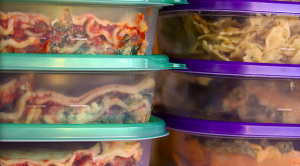We would all like to save a little bit of cash every month. Luckily, with a little planning, you can keep you budget under control without sacrificing taste and nutrition. Say good bye to Ramen noodles because the following tips can help any college student streamline their monthly grocery bill!
1. Plan Your Meals
One of the best ways to avoid constantly resorting to buying something to eat is to plan your meals. Over the summer, we got a bit off track with our meal planning, and our expenses crept up on us. Now, though, school has started up again, and the situation has improved. Meal plans are back in action.
Look at what you have handy, and create a meal based around that. There are number of ways to use different ingredients, and raiding the pantry can be a good way to avoid food waste as well. Before you go to the store, sit down and figure out what you want to eat for the upcoming week. Then, list out your ingredients. If you want to glance at the sales fliers to see what’s on sale, so much the better. Stick to your shopping list, avoiding impulse buys.
2. Cook from Scratch
Consider cooking from scratch. The ingredients you use often mean a lower per-person cost than buying something that is already prepped. If you are worried that you don’t have time, make the slow-cooker your friend. I look on my calendar to see what is happening. For days that I have to take my son to activities, or that I am volunteering, or that I have a heavy workload, I plan a slow-cooker meal. I get all the ingredients ready the night before, and put them in the fridge. The next morning, all I have to do is pull the meal out, and turn on the slow-cooker. A from-scratch meal is ready when I am, with a fairly small amount of work on my part.
If something is more involved, I plan that meal for a day when I know that I will have time. I’m not a big fan of cooking (my husband does a good deal of cooking), but when I do cook, I like to be unhurried, and I don’t want to stress about it. So planning my attempts to cook from scratch to coordinate with my schedule is a must.
3. Preserve What You Can for Later
Whether you are growing your own food (gardening can be a great way to save money on food), or buying in bulk, preserving what you can for later is a great way to save money in the long run. Buy foods that are in season, and then freeze, bottle, or dry them for use later. One of my favorite money savers is growing my own herbs. No need to even spend by buying in bulk. During the summer, we use fresh herbs with our meals, and then dry the extra so we have inexpensive herbs year-round.
You can preserve fruits and vegetables as well. Even if you don’t grow your own food, it’s possible to save by purchasing produce in season, and then preparing it for use later. You’ll spend less buying in season, and when it’s out of season, you’ll be able to go to your stores without heading to the grocery store. You can also freeze meat and other products that you buy on sale. We often freeze cheese for later use.
With a little planning, and creativity, you can save a good amount of money on groceries over the long run, and you don’t even need to spend the time clipping coupons.



